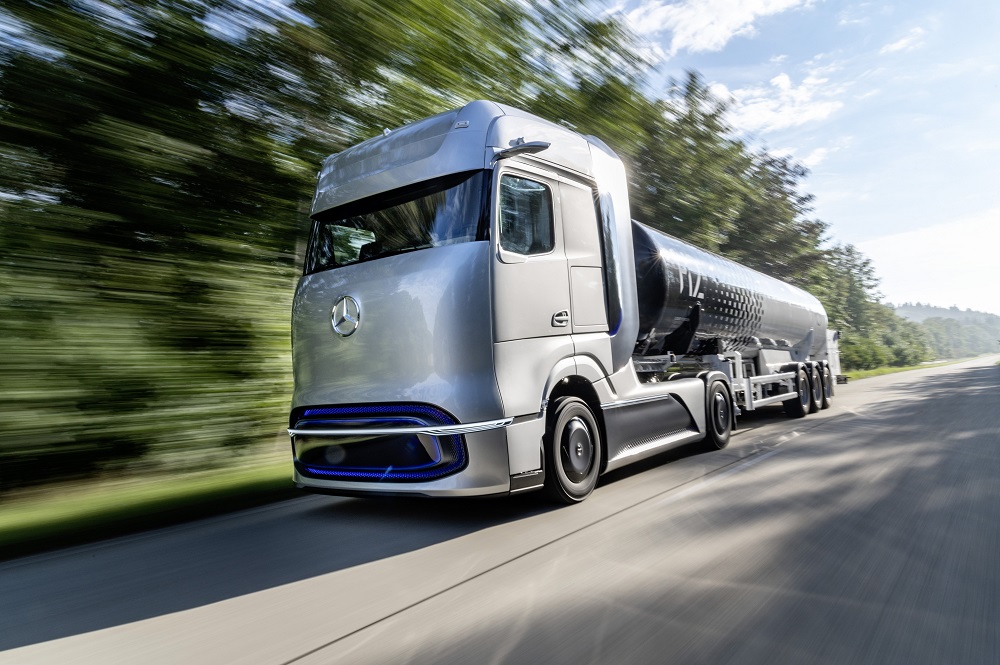In another development in the journey towards a carbon-neutral UK haulage industry, a whitepaper detailing research carried out by H2Accelerate has revealed ‘significant interest’ from the major operators in hydrogen trucks for a range of applications.

Giving a ‘thumbs up’ to the emerging vehicle technology, focus groups from companies with major operating fleets, like Amazon, DB Schenker, Kuehne-Nagel and Nestle Waters, have concluded that there is a high level of support within the industry for its adoption.
Understanding & Meeting End User Expectations
The research behind the whitepaper was carried out by H2Accelerate, a collaboration of major truck manufacturers that includes IVECO, Daimler Truck and Volvo Group, as well as hydrogen infrastructure companies TotalEnergies, Linde, OMV and Shell.
Titled ‘Understanding & Meeting End User Expectations’, the report found that there was much interest in the new vehicles in long-haul trucking, with some operators confirming they would be happy to pay more in the short term in order to trial a small quantity of fuel cell trucks.
Quoting the whitepaper directly, the conclusions were laid out as follows:
“There is significant interest in hydrogen as a zero-emissions trucking solution, with good awareness of its merits as a technology amongst end users”, with the whitepaper going on to say that organisations with public-facing decarbonisation targets are aware that hydrogen freight will be needed in addition to battery vehicles to achieve full operational decarbonisation.
Awareness of Increased Initial Cost
The research carried out also highlighted that end users were fully aware of and accepting of the fact that the cost and operation of hydrogen trucks would be more in the early stages of roll-out. Compared to the incumbent diesel trucking system, hydrogen trucks will be more costly and infrastructure more limited.
However, this was caveated by some end users who stated that their business model would require scaled improvements and supportive policy to allow hydrogen trucks to achieve parity with trucks running on diesel. Network design, vehicle maintenance and station availability will also need to offer the same flexibility and convenience currently afforded by diesel.
Speaking about the report, Linde’s VP of clean energy had this to say:
“The findings of this study confirm what we have been hearing from industry partners and customers for the past year or so: the heavy-duty transportation sector is on board with using hydrogen to effectively replace fossil fuels.
“We know that the technology is there – we have delivered over 200 fuelling stations around the world and successfully fuelled more than 1.5 million vehicles. Together with H2Accelerate members, we are now working on scaling up the technology and building a robust infrastructure to enable the heavy-duty transport sector to operate with zero emissions, reliably, and at a competitive cost.”
A Decarbonised UK Haulage Sector Moves Closer
The move away from a fossil-fuel-powered UK haulage sector is gathering speed, which has to be good news for the planet. Undoubtedly, there will be teething problems, but the industry’s will to work greener will surely make it a reality sooner, rather than later.
At HGVC, we support all efforts to decarbonise the sector, and we’ll continue our part in supporting UK haulage with industry-leading HGV licence acquisition programs. With an unsurpassed network of training centres across the UK, we’re well placed to help reduce the ongoing driver shortage.
If you’d like to know more about what we do and how we do it, please take the time to browse our website. However, to get in touch to talk about your training needs, either call us on 0330 818 8888 or click on ‘contact us’, and we’ll be happy to help in any way we can.
